One less paper towel a day
Do you dry your hands correctly? I know it sounds like a silly question. If your hands are dry, you’ve done it correctly, right?
I beg to differ.
Did you know Americans use 13 million pounds of paper towels every year?
Just on this campus, we currently use 7,750 miles of paper towels every year. That’s not a typo, that’s miles of paper towels. Need perspective? Laid end to end, that will get you from Omaha across the Atlantic, through Europe, and all the way to New Delhi, India — with 200 miles of paper towels to spare!
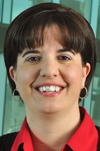
sustainability manager
But what are you supposed to do about it? Washing hands is important, as is drying them. The question is, how many paper towels do we really need to dry our hands? Most of us take three — some take a few more.
If you want to be really efficient you can get by with just one paper towel every time you wash your hands. For a quick tutorial on how to do it, check out this short TED talk video.
I’ll admit, I was skeptical. It’s not like our paper towel holders are stocked with the super-duper-absorbent-quilted-whatever paper towels. But I had to try. Much to my delight, the technique described works. You Melanie Stewart
sustainability managerdo have to follow all the steps, including the folding in half, with the most important part being shaking the water off.
Important note: Do not shake water all over the mirrors, counters and floors. Making a mess elsewhere isn’t sustainable or polite. If your infection-control procedures require you to do something specific, do not change your protocol. Health and safety is always more important.
Did you know that if every American used just one less paper towel per day, we would reduce the use of paper towels by 571.2 million pounds per year? That would save 11.4 trillion gallons of water and 4.8 million trees a year. Not to mention all the gas consumed and pollution emitted to convert trees into paper towels and transport them to their destinations.
I challenge you to try this out. One less paper towel per person per day. At home and at work, you can make a simple change that will have a huge impact.
Pinterest to Repurpose It
For those of you able to attend or watch online, we hope you enjoyed the LiveGreen Scene presentation from David Klitz with the Habitat for Humanity Restore. If you missed it, you can watch it from anywhere with this link:
You will need Quick Time on your computer to watch this presentation and can download it here. If you have issues viewing it, please contact the ITS helpdesk at 9-7700.
You may have also missed our announcement that LiveGreen now has a Pinterest Page! We have hundreds of ideas pinned that can be used for the Repurpose It Contest. Everything from sewing to carpentry with skill levels ranging from “never picked up a screwdriver” to “I have my own shop.” Entries do not have to come from this page, it’s just there to help you with ideas—and maybe inspire you with some other projects. 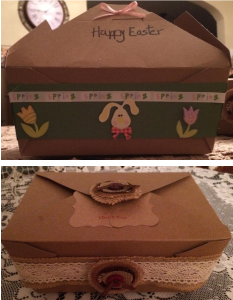
Some projects are big and seem really impressive, but it’s often the simple things that are the most inspiring. Remember the lunch boxes we were going to recycle from Wednesday’s LiveGreen Scene? A volunteer repurposed them—put leftover pieces of craft paper on the top or sides to make them cute boxes to give treats to friends and family. Others will be used to send leftovers home with kids who can’t remember to bring the good containers back. How awesome is that?!?
The LiveGreen Pinterest page also has:
- Gardening tips, plants and flowers (yeah, it’s finally Spring!)
- Recipes to use what you have grown
- Information on food storage, different edibles, and definitions of organic and non-GMO foods
- Tips and recipes for “green cleaning” (non-toxic, and they will save you money!)
- Pictures of natural wonders and all kinds of animals (reaffirming how amazing this planet really is)
- And some items that are just for fun because, you know, it’s Pinterest!
If you need further inspiration or places to find supplies, check out both locations of the Habitat for Humanity Restore. Their inventory changes weekly. Have items to help the cause? You can drop them off or contact them to arrange pick up.
Also, Reclaimed Enterprises facilitates deconstruction in metro area buildings and saves items for sale and repurposing. Trim, doors, old growth lumber, they have it all. Contact them for more information.
Happy repurposing, we look forward to your entries!
Earth Week Events on Tap for Campus
Since 2011, LiveGreen has been proud to help the campus celebrate Earth Day by planning a week’s worth of activities, known on campus as Earth Week. This year, Earth Week will be held Ap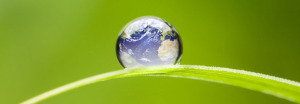 ril 20-24.
ril 20-24.
Last year you asked for more notice of these events. LiveGreen is proud to announce our bigger and better line-up of activities.
Monday: Kick off Earth Week by celebrating trees and Arbor Day. We will have a tree planting in front of the Durham Research Center buildings at 10:30 a.m. Free serviceberry trees will be available on a first-come, first-served basis.
Tuesday: Second annual RePurpose It Contest! This year we have even more prizes to award, so start preparing your entry now! Entries must contain an item that has been repurposed to make something new. Check out the LiveGreen website for more details. Attend Wednesday’s lunch and learn at noon in the Eppley Science Hall Auditorium for tips, tricks, and inspiration.
Wednesday: Earth Day’s 45th anniversary will be celebrated worldwide. Take part in local and online events. We will provide additional information online.
Thursday: Bring your personal recycling and shredding. This is a favorite event, and this year we are collecting even more items! In addition to personal electronics and personal documents to shred we will take personal alkaline/single use batteries as well as “techno-trash” which will include VHS tapes. Please visit the LiveGreen website for a full list of items we will accept as well as prices for recycling some of them.
Friday: You asked us to provide a variety of information that would help you to be more sustainable, so we are happy to announce the inaugural Sustainability Expo! Come visit us in the Ruth and Bill Scott Student Plaza (rain location: Durham Outpatient Center atrium) from 11:30 a.m. to 1:30 p.m. to get information from local experts. We’ll have information on recycling, food, composting, travel and gardening — just to name a few. There will be experts on hand to answer your questions, plus more free trees and wildflower seeds. This year, Spirit Day will celebrate with us, providing snacks, prizes, and more giveaways! Information is still being added, so check the LiveGreen website often for updated information.
LiveGreen looks forward to celebrating Earth Week with you. Make sure to add these events to your calendar! If you would like to volunteer to help at Thursday or Friday’s event, please email us.
Preparing for Repurpose It Contest
Last year during Earth Week, LiveGreen held its first ReUse It contest. You were invited to take any item that had outlived its original purpose and transform it into something new.
We had a lot of great entries and even if you didn’t enter, lots of ideas to inspire you to reuse in your own home.
That contest will return this year with even more prizes and LiveGreen would like to help get you started now.
Next Wednesday, March 18th at noon in the Eppley Science Hall Auditorium (3010) Habitat ReStore Director, David Klitz, will present helpful tips, tricks and ideas for affordable repurposing, recycling and remodeling—all using Habitat ReStore materials. Bring your drink in a reusable container and LiveGreen will provide the first 50 attendees with a boxed lunch.
Your entries do not have to use items from the Habitat ReStore, but if you need ideas, inspiration, or something to make your project complete, they may be able to help.
Contest rules will be announced at the end of the presentation and you can get started!
Who: All employees and students on campus
What: Habitat for Humanity ReUse It Demonstration
When: Wednesday, March 18th at 12pm
Where: Eppley Science Hall Auditorium, room 3010 (main level when entering from South side)
Why: To learn about ways to reuse common household materials, save money, save the planet, and to inspire you to begin your Earth Week ReUse It Contest project
And: Boxed lunches will be provided for the first 50 attendees, please bring your own drink in a reusable container
Want to watch, but can’t leave your desk? Click here to watch live from your desktop.
Want to watch it later? Click here to watch anytime, anyplace (but give us a little time to get it uploaded).
You will need Quick Time on your computer to watch this presentation and can download it here. If you have issues viewing it, please contact the ITS help desk at 9-7700.
Omaha’s two Habitat ReStore outlets are nonprofit home improvement stores and donation centers that sell new and gently-used furniture, home accessories, building materials (doors, cabinets, windows, lighting, flooring, etc.), and appliances at up to 70% off their new retail price. Omaha’s Habitat ReStore sells these items to the general public with proceeds going toward building and renovating additional Habitat homes in the area.
Anatomy of a Parking Fee
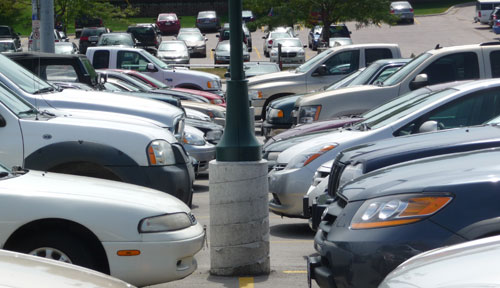
Last fall we started a process to provide more alternatives to transport people to work in ways other than a single occupant vehicle. As we work on these Active Transportation options, the most common concern we hear revolves around the cost of parking: Why do we have to pay to park here? Where does all that money go?
Seemed like this should be something I should know, so I decided to find out.
As it turns out Parking does not generate profit. Yes, money is collected but it actually covers a variety of expenses. I was shocked to learn that a major snowstorm can cost us $45,000 or more! While some businesses can wait until it stops snowing to clear snow, we are 24/7 and for your safety sidewalks and lots are continuously and repeatedly cleared and salted, while snow from parking garages actually has to be hauled off site.
Here’s a list of where your parking fee goes: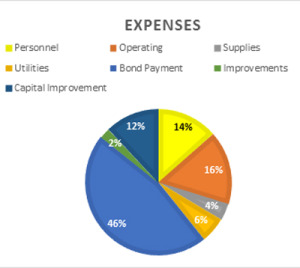
- Bond Payment; paying off loans and interest for the construction of parking garages, 46%.
- Operating Expenses; snow removal, jumpstarts, 16%
- Personnel; staffing for Parking office and enforcement, 14%
- Utilities; water and electricity in parking lots and garages 6%
- Supplies; fuel, signage, hardware, elevators, mandatory fire alarm testing, 4%
- Improvements; resurfacing, minor repairs, lighting upgrades, 2%
- Capital Improvement; whatever is leftover is put into Capital Improvement to cover future major expenses or overages, averages 12%. This covers anything from the unexpected demo of Lot 4, excessive snow, expansion joint repair, or expenses related to vandalism. Collecting a little bit at a time prevents them from having to increase parking fees by a large amount anytime something major happens. All money goes back into parking infrastructure, it doesn’t cover anything outside of that. If this account has more money than it needs, your parking rates may stay the same. If not, they could go up.
So this begs the question, how do other places in town handle parking if they don’t charge their employees to park? Answer: they do, they just don’t tell them. If parking is owned or leased by an employer, the employee helps to pay for expenses. It may not be a line-item on the pay stub, but they pay for it with fewer vacation days, fewer benefits, smaller raises, something. We have an advantage because we have a choice. If I don’t want to pay, I don’t park and that’s money I save.
Interested in saving money? We’ll be rolling out multiple options this spring that will get you to campus while saving you money.
For the Birds
I intended to write this article a month ago, but it was warm then and the subject didn’t seem important. Now it’s cold again and the seed heads I purposely left in my garden are either depleted or frozen to the ground under the weight of the snow we had a little while ago.
What am I talking about? I’m talking about feeding the birds. A few weeks ago my yard was full of woodpeckers, cardinals, blue jays, chickadees and, yes, a couple of either very tough or very confused robins, and I enjoyed watching them. There were other birds too, but I don’t know what they were. They all seemed to have plenty to eat and foraged under the leaf mulch around the bushes. Now the yard is a frozen wasteland – no birds, no squirrels, at least nothing I can see.
I haven’t put out bird feeders, but I did put out muffins that we forgot to eat, hoping to entice the little feathered darlings to come back. Well, the dog ate what she could reach and the rest sat there for a week. I didn’t see any birds, so I brushed the crumbs off into the snow.
Here are some tips from the National Wildlife Federation:
- Birds need a winter water source – set out a pan of warm water sometime during the day.
![Card0224[1]](https://livegreennebraska.com/wp-content/uploads/2015/02/Card02241-300x172.jpg)
- Put out seeds, cracked corn, nuts, and suet. The added fat helps keep birds warm.
- Leave the seed heads of asters, cone flowers and other plants in the fall.
- Leave the berries and other fruit on native trees and bushes.
- Leave your fallen leaves on the ground; decaying leaf litter provides a home for insects, a feast for the birds.
- Provide shelter – evergreens, a brush pile, bird houses if you’re ambitious.
- Clean your bird feeders every 2 weeks to prevent mold and bacteria that may make birds sick.
- Rake the ground below feeders to limit accumulation of waste.
- Keep your cat indoors – it’s so much fun to watch a cat watching birds!
- Put feeders 30 feet away from windows or within 3 feet of a window to reduce deaths by window strikes…far enough away so they can avoid a strike or close enough that they can’t pick up enough speed to seriously injure themselves.
Maybe this weekend I’ll put out birdseed, or at least a pan of warm water once a day.
Re-using ‘retired’ lab coats
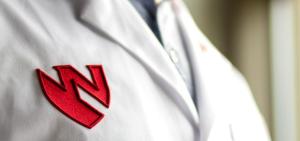 As announced in Nebraska Medicine Now and UNMC Today, lab coats with the old brand will be retired Aug. 15. Some of you already have new coats and others will be getting them soon.
As announced in Nebraska Medicine Now and UNMC Today, lab coats with the old brand will be retired Aug. 15. Some of you already have new coats and others will be getting them soon.
That led to the question: what can we do with the old one besides sending it to the landfill?
LiveGreen set out to find a sustainable option, ideally either recycling or upcycling them into something else.
Unfortunately it’s hard to recycle a fabric that is a blend (65% polyester/35% cotton) especially with the cotton on the lesser side. This blend helps lab coats stand the test of time though, so they should be able to be reused, right?
I looked into some options and found that they could be used on our own medical service trips and some local schools could use them as well. They often don’t have the budget for heavy coats and buy plastic aprons that are thrown away. If we can get coats to them, it’s a win-win-win!
Turns out it’s not quite that simple. UNMC and Nebraska Medicine want to protect your identity as well as their credibility—we can’t have people running around in lab coats pretending to work here or worse yet, pretending to be you.
So, back to the question at hand, what can we do with old coats? It turns out it doesn’t take too much effort to remove the branded patch and, if applicable, the embroidery with your name and department. This is especially true if you only remove enough so that words aren’t legible.
If you would like to see your old lab coat donated to a worthy cause, you can remove your name, department, and patch and then:
- Contact Sara Pirtle to donate them to the medical service trips.
- Drop them off at the UNMC Bookstore. They also use them to send to groups on campus to try on (so they don’t have to go to the bookstore, particularly good for people out of town). If you have large quantities call them to schedule pickup.
- Drop them off at The Company Store, located on the first level of Clarkson Tower near the entrance to Clarkson Cafe.
- Contact LiveGreen to schedule a pickup.
Farm-fresh produce available to UNMC community
By UNMC Public Relations
For the fourth consecutive year, UNMC students and employees can sign up to receive farm-fresh produce and dairy delivered weekly to campus this summer. The deadline is March 31 to sign up for the UNMC Community Supported Agriculture (CSA).
CSA will begin delivery the week of May 18.
Robin Jaeckel, administrative associate for the dean’s office in the College of Public Health, coordinates UNMC’s corporate membership.
“We bring the farmer’s market to you. The bags are conveniently delivered to the Maurer Center for Public Health building,” she said.
For the first time this year, participants can arrange to pick up their CSA bags at any Omaha area Hy-Vee.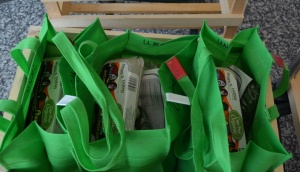
A standard produce bag is $20 per week and a standard produce bag plus bi-weekly eggs and cheese is $25 per week. A small loaf of bread from Great Harvest and other local bakeries and organic eggs are available at extra cost. Participants also can order additional items available in the store from Tomāto Tomäto’s website and pick them up with their weekly bag.
The program, organized by Tomāto Tomäto, a year-round indoor Farmer’s Market in West Omaha, was first introduced in the fall of 2012 and UNMC was a test site. The program has grown in popularity among employees, from 37 to 109 participants, Jaeckel said. Now, Nebraska Medicine and Children’s Hospital are corporate sponsors as well.
Fresh food will be delivered to campus one day every week in the CSA bags until Aug. 29. “If you get something you don’t like or can’t have, you can swap it with another ‘bag buddy’ or donate it,” Jaeckel said. Co-workers can split the cost and contents of the bag if this is too much produce for them.
Tomāto Tomäto also inserts a weekly newsletter in the bags that identifies the farmers who supplied the produce and simple recipes for the produce. Jaeckel also emails the bag’s contents and more recipes to participants a few days before the weekly delivery.
Contact Jaeckel to obtain a UNMC corporate enrollment form.
A Stairwell Worth a Stare

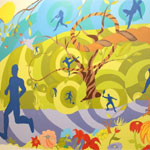 There’s something new to look at when you take the stairs in University Tower. Brightly colored paintings now fill the landings of the stairwells, taking the place of the institutional blank walls.
There’s something new to look at when you take the stairs in University Tower. Brightly colored paintings now fill the landings of the stairwells, taking the place of the institutional blank walls.
LiveGreen volunteer Cindy Hanssen and Kara Haworth sold reusable hot/cold beverage cups to raise money for the murals. The original mural was painted by Omaha North Students as part of Nebraska Medicine’s “Stairwellness” program.
Enthusiastic feedback made it obvious that the rest of the walls were pretty drab. To continue the effort to improve employee and patient experiences, more cups were sold and Legacy funds allocated for painting the rest of the stairwells. Hanssen found Kelli Zaugg and Stephen Kavanaugh; both local artists to paint murals on additional landings.
“The murals give people a different perspective than a white wall to look at while moving from floor to floor and are in different styles to appeal to a variety of tastes. We are excited to support local artists and to have the public art on campus.” Hanssen says.
“It’s pretty cool for a hospital to do something like this” Kavanaugh said.
The feedback from patients and employees has been so positive, that Channel 3 recently featured the work in a news story.
You can help conserve power, burn calories, improve your health and lift your spirits, and reduce waste while filling your reusable mug with coffee at a reduced price. It’s a win-win-win-win-win, so stop waiting for the elevator and go check out the murals in the stairs! The final landing will be painted soon.
Need more motivation to take the stairs?
- You will get there faster. Taking a quick flight or two of stairs beats waiting for the elevator.
- You burn more than 50% more calories walking up stairs than on flat surfaces and 66% more calories than standing in an elevator.
- This will leave more space in elevators for patients and visitors.
- Save the energy required to move the elevators from floor to floor.
- Movement can improve your overall health.
- Make your Fitbit happy.
- Use stairs throughout the day to help you keep your New Year’s resolution
Next time you are in the area, be sure to check it out!
By the way, these benefits apply to all stairwells on campus
Got Supplies?
You’ve probably heard of the medical service trips International Health & Medicine leads to underdeveloped areas around the world. This year is no different as almost 70 people will be headed to Jamaica and Nicaragua, as well as a local Native American Reservation. Students from COM, CON, COP, COPH, and SAPH will give up their spring break to work in the heat, bugs, and extreme poverty to treat the citizens in these areas, which often lack access to even the most basic medical care. Thousands of people are treated each year while students and staff gain a meaningful cultural and medical experience.
Did you know our volunteers need supplies and equipment to take with them to Jamaica and Nicaragua?
Basic items like band-aids & gauze, vitamins, and even medication are needed. Health care workers often don’t have lab coats or protective equipment, don’t have equipment to help them diagnose the malady, and may still be learning from outdated books.
In order to provide extraordinary care and cutting edge research, we often upgrade equipment but the old versions still work. But those models are still far more advanced than many of the areas they visit have. In some cases this can apply to the 2000 version or the 1980 version.
Instead of sending these items to surplus, consider sending them to help patients in other countries receive a higher standard of care. Don’t have equipment, how about supplies?
Here’s what you need to know:
- All medical supplies, medications, and ointments need to be unopened and non-expired.
- Unopened/non-expired toothpaste and toothbrushes are always welcome.
- Non-prescription medications and other over the counter items are needed, everything from anti-biotic creams and anti-fungals, to pain meds and vitamins.
- Medical/teaching books are welcome, as long as they aren’t volumes—volunteers have to carry them down there!
- Equipment must be in working condition. If you have instruction manuals, include them.
- Equipment cannot be too high tech or require a lot of hard to get supplies—these countries don’t have the infrastructure to support it.
Don’t know what to do with you old lab coat once you get your newly branded one? They need those too! Just remove the UNMC/TNMC/UNMCP patch and the embroidery so no one can pretend to be you.
Have items to donate? Want to check on a supply or piece of equipment first? Contact Sara Pirtle at sepirtle@unmc.edu or 559-2924.

![Anne0701[1]](https://livegreennebraska.com/wp-content/uploads/2015/02/Anne07011.jpg)